List of British consorts


A royal consort is the spouse of a ruling King or Queen. Consorts of monarchs in the United Kingdom and its predecessors have no constitutional status or power but many had significant influence over their spouse. Some royal consorts, such as current consort Prince Philip, Duke of Edinburgh, have also helped to enhance the image of the Monarchy by becoming celebrities in their own right.
Since the foundation of the Kingdom of Great Britain, it and the United Kingdom of Great Britain and Ireland have had ten royal consorts. Queens between 1727 and 1814 were also Electress of Hanover, as their husbands all held the title of Elector of Hanover. Between 1814 and 1837, queens held the title as Queen of Hanover, as their husbands were Kings of Hanover. The personal union with the United Kingdom ended in 1837 on the accession of Queen Victoria because the succession laws (Salic Law) in Hanover prevented a female inheriting the title if there was any surviving male heir (in the United Kingdom, a male took precedence over only his own sisters, until the Succession to the Crown Act 2013 which removed male primogeniture.) In the Austro-Prussian War of 1866, Hanover was annexed by Prussia and became the Province of Hanover.
All female consorts have had the right to be and have been styled as queens consort. However, of the three British male consorts to have existed since 1707, none was considered king consort:
- Prince George of Denmark, husband of Queen Anne likewise never received the official style of Prince Consort, but was raised to the peerage of England as the Duke of Cumberland in 1689, several years before his wife's accession in 1702.
- Prince Albert of Saxe-Coburg and Gotha, husband of Queen Victoria, did not take an English peerage title but was granted the title of Prince Consort as a distinct title, in 1857, the only male consort in either the United Kingdom or its predecessor realms to have officially held the title. It was suggested at first that he would in fact become King, but this was decided against by the Government.
- Prince Philip of Greece and Denmark, husband of Elizabeth II, already raised to the peerage as Duke of Edinburgh in 1947, was made a Prince of the United Kingdom in 1957. He is not styled as Prince Consort.
Not all wives of monarchs have become consorts, as they may have died, been divorced, had their marriage declared invalid prior to their husbands' ascending the throne, or married after abdication. Such cases include:
- Sophia Dorothea of Celle, wife of George I of Great Britain (as heir to the electorate of Hanover), married 22 November 1682, divorced 28 December 1694, died 13 November 1726.
- Maria Anne Fitzherbert, wife of George IV of the United Kingdom (as Prince of Wales), married 1785, marriage declared null, died 1837.
- Wallis Warfield Simpson, wife of Edward VIII (as Duke of Windsor), and therefore not the wife of a reigning king, married 3 June 1937, died 24 April 1986.
An unusual case was that of Caroline of Brunswick, who had separated from her husband George IV prior to his accession, and although his consort in law, had no position at court and was forcibly barred from attending George IV's coronation and being crowned. This caused public outrage.
Since 1707, only George I and Edward VIII have been unmarried throughout their reign.
If Charles, Prince of Wales, ascends the throne, his second wife, Camilla, Duchess of Cornwall, will automatically take on the title and style pertaining to the queen consort unless legislation is passed to the contrary. It has been stated, however, that it is intended that she should be styled not as a queen consort, but as "princess consort".[1]
Consorts of the Kingdom of Great Britain (1707–1801) and the United Kingdom (1801–present)
House of Stuart
| Picture | Coat of arms | Name | Parents | Birth | Marriage | Became consort | Coronation | Ceased to be consort | Death | Resting Place | Spouse |
|---|---|---|---|---|---|---|---|---|---|---|---|
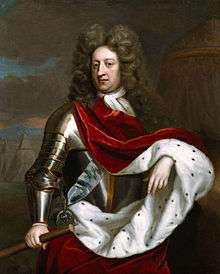 |
 |
Prince George of Denmark and Norway | Father, Frederick III of Denmark and Norway Mother, Duchess Sophie Amalie of Brunswick-Lüneburg |
2 April 1653 | 28 July 1683 | 1 May 1707 Creation of the Kingdom of Great Britain |
Not crowned | 28 October 1708 | Westminster Abbey | Anne | |
House of Hanover
House of Saxe-Coburg and Gotha, renamed House of Windsor in 1917
| Picture | Coat of Arms | Name | Parents | Birth | Marriage | Became consort | Coronation | Ceased to be consort | Death | Resting place | Spouse |
|---|---|---|---|---|---|---|---|---|---|---|---|
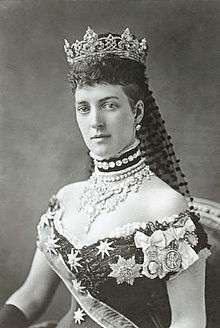 |
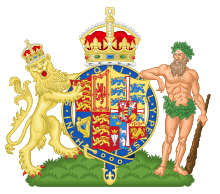 |
Princess Alexandra of Denmark | Father, Christian IX of Denmark Mother, Princess Louise of Hesse-Kassel |
1 December 1844 | 10 March 1863 | 22 January 1901 Husband's accession |
9 August 1902 | 6 May 1910 Husband's death |
20 November 1925 | St George's Chapel, Windsor Castle | Edward VII |
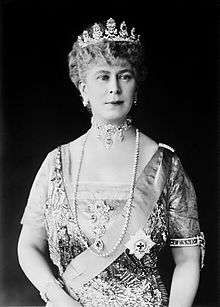 |
 |
Princess Mary of Teck | Father, Prince Francis, Duke of Teck Mother, Princess Mary Adelaide of Cambridge |
26 May 1867 | 6 July 1893 | 6 May 1910 Husband's accession |
22 June 1911 | 20 January 1936 Husband's death |
24 March 1953 | St George's Chapel, Windsor Castle | George V |
 |
 |
Lady Elizabeth Bowes-Lyon | Father, Claude Bowes-Lyon, 14th Earl of Strathmore and Kinghorne Mother, Cecilia Cavendish-Bentinck |
4 August 1900 | 26 April 1923 | 11 December 1936 Husband's accession |
12 May 1937 | 6 February 1952 Husband's death |
30 March 2002 | St George's Chapel, Windsor Castle | George VI |
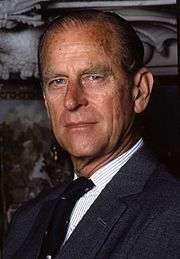 |
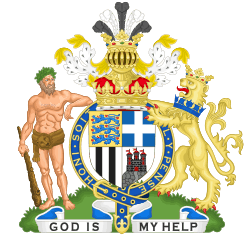 |
Prince Philip of Greece and Denmark | Father, Prince Andrew of Greece and Denmark Mother, Princess Alice of Battenberg |
10 June 1921 | 20 November 1947 | 6 February 1952 Wife's accession |
Not crowned | Incumbent | Elizabeth II | ||
References
- ↑ "Announcement of the marriage of HRH The Prince of Wales and Mrs Camilla Parker Bowles". The Prince of Wales.gov.uk. 10 February 2005. Retrieved 2015-06-06.








